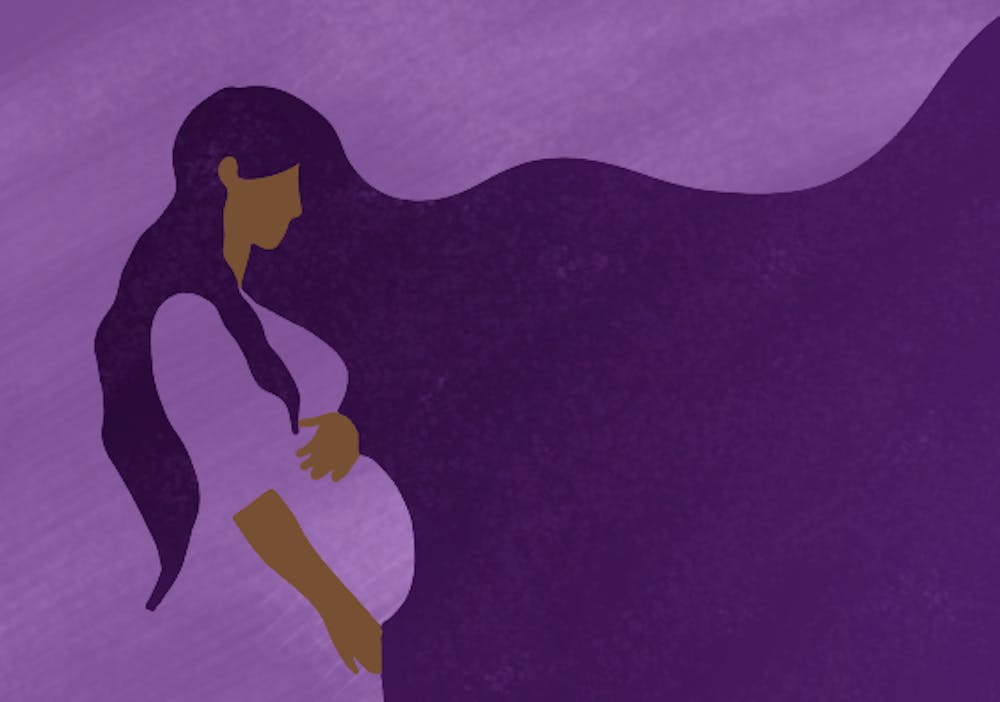Due to the continued impact of racism in the U.S. healthcare system and existing societal inequities, Black women are three to four times more likely to die from pregnancy or child-birth related causes such as preeclampsia, hypertension, preterm labor, hemorrhage and infection while Black children are two times more likely to die as newborns and be born underweight and premature. Understanding the implications of these health disparities is crucial to eventual implementation of treatment and policy changes in the scope of healthcare environments.
Benita Mayo, community fellow at the U.Va. Equity Center, is working to give perspective on the impact of maternal health disparities on Black women and newborns through a photo documentary. University sociology doctoral candidate Patrice Wright has been assisting Mayo as a source given that her research focuses on African American maternal disadvantage and how Black women emotionally process pregnancy.
These disparities in healthcare are due to the impact of racism and segregation hidden within the infrastructure of U.S. society. To this day, historical residential segregation puts Black people at a disadvantage for proper wages, educational opportunities, environmental factors and healthcare access, whether through hospital care or insurance.
“Just the day-to-day experiences of living in America as a Black person can cause stress,” Wright said.
Black women particularly have been shown to experience more “weathering” or persistent health deterioration as a consequence of repeated environmental stressors throughout their lifetime like social, economic and political adversity. This means that due to the effort they must exert to cope with acute and chronic stressors, they gain higher wear and tear on the body that wears on their systems, deteriorating their health quicker and aging them faster.
“So in addition to poverty, joblessness, underemployment — all of which has stress — experiencing racism and discrimination adds stress,” Wright said. “All of those things can impact one's health, specifically in low birth weight, but also having other health complications.
Mayo, like Wright, saw the prevalence of these inequalities and discrimination and felt that she could utilize her skills as a photographer to illustrate Black women’s experience through pregenacy and childbirth in today’s society.
“I remember hearing two stories on the news that just really made an impact, and once I heard the stories, I couldn't unhear them,” Mayo said, referencing Beyonce and Serena Williams sharing their own experiences with pregnancy and childbirth. “I thought to myself if these women are not being listened to, then what chances does the average person have?”
Both celebrities endured difficult pregnancy complications that resulted in them undergoing emergency cesarean deliveries. Beyonce developed preeclampsia, which can cause seizures, high blood pressure, and restricts fetal growth, and Serena Williams developed a pulmonary embolism due to blood clots that caused shortness of breath.
Not long after, Mayo began her photo project in partnership with Birth Sisters of Charlottesville by meeting with Doreen Bonnet, the executive director of Birth Sisters of Charlottesville, and was given the opportunity to take a doula training class.
“I realized that people needed to know more about them and more about what they do,” Mayo said.
The Birth Sisters of Charlottesville is a doula collective composed of women of color that support other women of color during their pregnancies while also addressing the disparities in maternal health. As doulas, the group’s members support their clients through the entire pregnancy and birth process, from prenatal visits to labor and delivery to postpartum checkups.
“We know that our mothers feel more confident about their birth journey, and they feel like that because we can relate to each other,” Bonnet said. “They just feel more at ease, and they really like that there's someone there to advocate for them.”
Since doula support is only one solution to this greater problem, Birth Sisters of Charlottesville also participates in multiple forms of advocacy by presenting data to medical professionals, working with the state for medical benefits and funding for doula services and organizing an exploratory committee to bring a Black OBGYN to Charlottesville.
Change all comes down to awareness and communication, which is what Mayo’s project hopes to accomplish. She hopes to capture a sense of what Black women actually go through, which is very different from other races, and eventually help fundraise for the doula community.
“I think my project will be a benefit because photos are powerful, and photos have the ability to affect change,” Mayo said.
Mayo plans to maintain a relationship with five to six mothers participating in doctor’s visits and the births as a doula herself to illustrate not only an inside look at the experience of pregnancy and childbirth by Black women but also the nuances of their everyday lives. She hopes to accomplish this by following a mother through a normal day, so she can be there to capture looks of frustration or a mother’s crushed face after a doctor’s appointment, eventually culminating in the joy of childbirth.
“I hope that they feel the resiliency of Black women in this community because we are very resilient in spite of what we encounter and we move through it,” Bonnet said.
Not only does this project bring awareness and education to the public but it also provides hope for these mothers.
“I'm hoping you'll see a lot of joy in the outcomes,” Bonnet said, “We want them to be honored. We want outcomes to be celebrated. We want them to be seen and heard.”
Mayo’s photo documentary is expected to be published by the end of the year.







